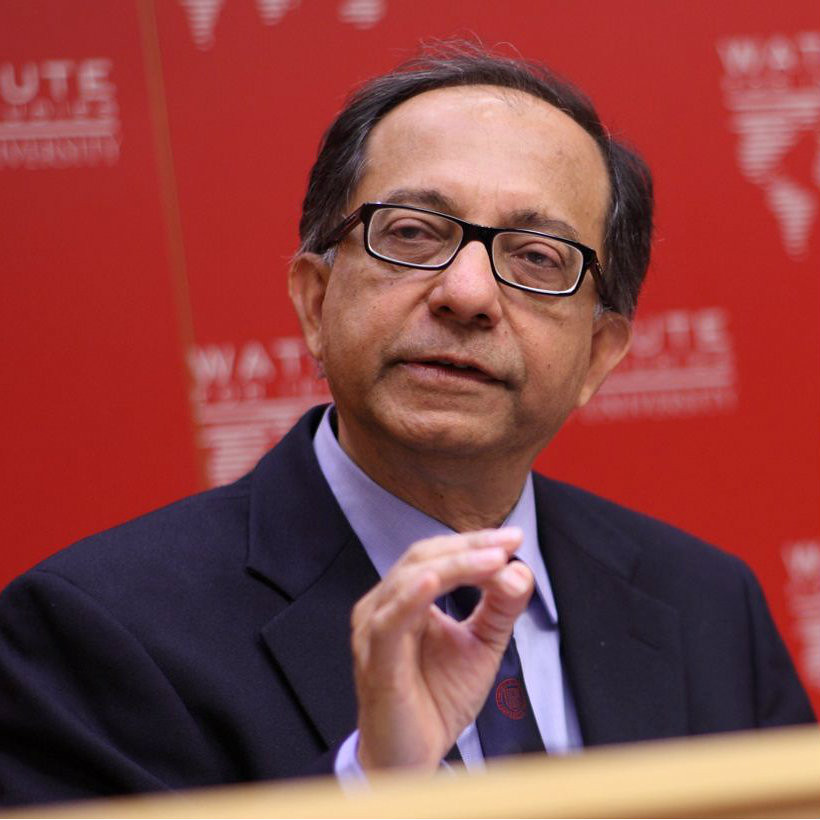It is my pleasure to introduce Professor Kaushik Basu, Professor of Economics and C. Marks Professor of International Studies at Cornell University and, until recently, Senior Vice-President and Chief Economist at The World Bank. Professor Basu has thus combined an academic career at the highest levels with being ‘an economist in the real world’, as he puts it in the title of his most recent book. Professor Basu is an internationally renowned leader in the field of Development Economics and this commitment to rigorous analytical research with a strong focus on policy analysis has characterised his work throughout his career.
Professor Basu holds a doctorate in economics from the London School of Economics. He has held academic and visiting posts at leading universities throughout the world, including the LSE, Harvard, Princeton and MIT. From 2009 to 2012, he was the Chief Economic Advisor to the Government of India. Among other posts, he has also served as the President of the Human Development and Capabilities Association and as a member of the steering committee of the Expert Group of Development Issues. He is a Fellow of World Academy of Sciences. He holds a number of honorary degrees and has been awarded one of India’s highest civilian awards, the Padma Bhushan, by the President of India. He will take up the role as President of the International Economic Association in 2017.
Professor Basu has been very influential in setting the academic agenda in development economics. For example, his 1998 paper Economics of Child Labour, in which child labour was placed within the context of the household economy, inspired huge interest and admiration. This work has changed the way in which the problem of child labour is conceptualised and hence had important policy implications. In subsequent publications, too many to list in full but including Analytical Development Economics (1997) and Prelude to Political Economy: A Study of the Social and Political Foundations of Economics (2000) he continued to develop his innovative thinking and analysis, putting issues of welfare and inequality at the centre of development economics. In the field of game theory, Professor Basu developed the Traveller’s Dilemma in 1994, which many of you will know (it concerns lost suitcases and valuable antiques). This has generated a lot of research, from laboratory experiments by economists to mathematical extensions by computer scientists. In 2010, he published Beyond the Invisible Hand: Groundwork for a New Economics, a book which provides a compelling critique of mainstream economics, arguing that issues of culture and custom must be taken into account in a rigorous theoretical framework for economics.
This thinking translates into his practice as a ‘real-world economist’. In his time at the World Bank, Professor Basu proposed, and has been a champion of, the concept of ‘Shared Prosperity’ as a measure of societal progress. This focuses on both economic growth and equity - not simply economic growth by itself but economic growth that benefits the poorest people in society. In a recent interview with the Financial Times (February 2016), Professor Basu talked about putting his ideas into action at the World Bank: ‘one of my first projects was … about the role of psychology and social norms in promoting development … When we think of development and growth we stress on getting our fiscal policy right, monetary policy right, taxation system right and indeed those are extremely important. However, a society’s development also depends on the social norms and mindsets of the people … Basic honesty and integrity are not just good in themselves but promote growth. Tolerance is not just good value but good economics’. Honesty, integrity, tolerance – these are important values for the world today, values that cannot be stated too often or emphasised too much. Professor Basu has been steadfast in these and in his commitment to seeking to make the world a better place – truly an inspiration to us all.
Vice-Chancellor, I present to you Kaushik Basu, who is eminently worthy to receive the degree of Doctor of Laws, honoris causa.
Professor Jane Millar OBE
Orator
